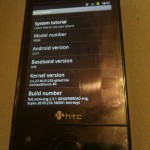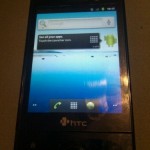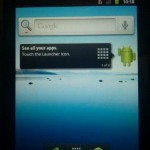(The following is a technical glimpse at a current XDAndroid development topic aimed at intermediate or advanced users and developers.)
Chances are if you’ve been using XDAndroid on a Rhodium, you’ve been hit by this annoying bug: the device is painfully slow from the time the XDAndroid boot animation begins. This is a bug seen mostly be Rhodium users and of varying degrees of consistency. Some people see it nearly every boot, others see it once in a handful of boots. When investigating the running environment while it’s happening, there is no interesting logcat or dmesg output, and top shows system_server hogging at least 95% of the CPU time.
An effective workaround has been to place a short phone call to the voicemail service and hang up. For whatever reason, this would cause system_server to calm down and act normal for the rest of the XDAndroid session. A more radical (and perhaps less effective) solution was to re-enable Dalvik’s JIT execution and put up with the various bugs it would potentially reintroduce. Somehow, JIT was able to mitigate the bug to the point that casual testing did not reproduce the system_server issue.
Upon further investigation by several XDAndroid team members (most notably arrrghhh and WisTilt2), the bug had been tracked down to the userland libraries used by XDAndroid for hardware support. This meant it was either an issue in the RIL, GPS or sensors (accelerometer) drivers. After even more testing by arrrghhh, who readily volunteered to test an unfinished internal Gingerbread build, it was determined that the likely culprit was the sensors driver, which remains missing in Gingerbread.
At my request, arrrghhh performed repetitive testing on our latest Froyo release (FRX04) with JIT disabled. With the sensors driver in place, the issue was reproduceable on essentially every boot. After removing the sensors driver, it could not be reproduced once. This was a very telling result, so it was time to figure out where the issue was in the sensors driver.
Finding the issue was actually relatively trivial. Such a runaway process usually indicates an uncontrolled loop. The sensors driver continuously checks for data from the sensors devices while Android is running. In our driver, the code responsible for that check is seemingly prone to infinite looping in a specific case where incomplete data is received from the sensors device. In practice, this case occurs frequently on Rhodium and sends system_server into fits. I’m guessing that making a phone call causes Android to query for a proximity sensor, which bails the sensors driver out of that loop to process the request (and then it goes back into the loop and is able to read data normally).
So, since the logic generally looked sound in the loop, the simplest and most likely solution was to add a delay while handling that corner case of incomplete data. For testing, we used an unreasonably large delay and added it in the general case for the loop, ensuring that the loop could never become a runaway in proper runtime conditions. Through more tedious testing, arrrghhh was able to confirm that the delay solved the runaway system_server issue (while making the sensors unusable).
After making that loop delay much shorter and placing it in the corner case exclusively, testing continued to show success. So it seems like the system_server bug is finally defeated. We’ve already released a new rootfs with the relevant change integrated. Give it a try and let us know how it works out, via the IRC channel or the aforementioned bug. Thanks for reading!




